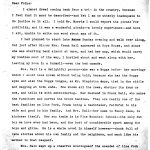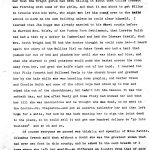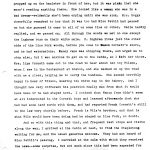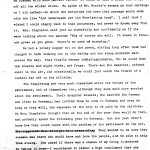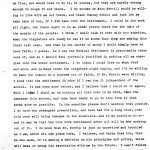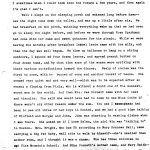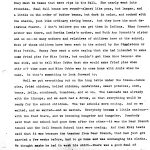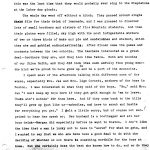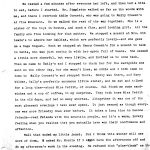Pine Mountain Settlement School
Series 09: BIOGRAPHY
Alice Cobb Stories
Line Fork Community Remembers Miss Pettit
1936
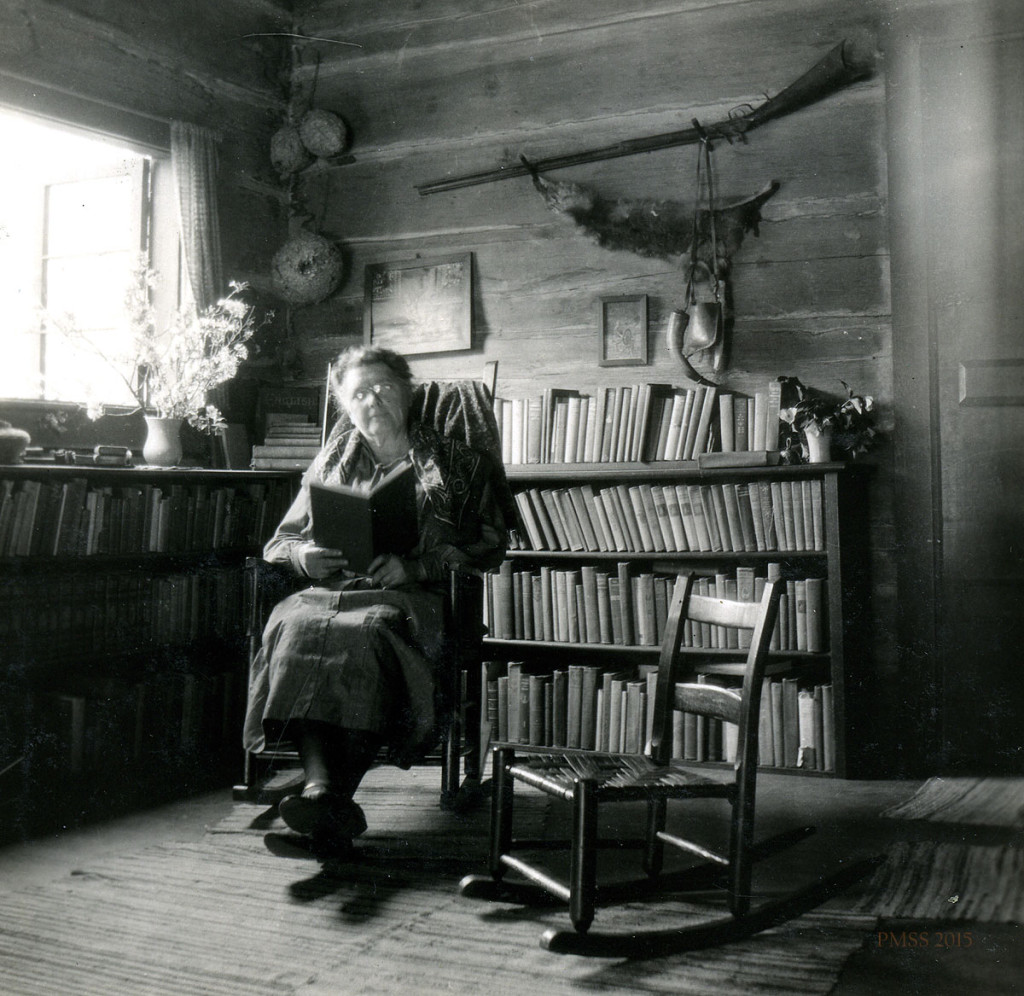
TAGS: Alice Cobb Stories, Visit to Line Fork, Miss Pettit’s death 1936, Alice Cobb, Line Fork KY, Katherine Pettit, Pine Mountain Settlement School, Harlan County KY, Line Fork Medical Settlement, Dr. Ida Stapleton, Rev. Stapleton, Labor Day picnic, community
ALICE COBB STORIES Line Fork Community Remembers Miss Pettit 1936
TRANSCRIPTION
[NOTE: Miss Katherine Pettit, PMSS co-founder and co-director, died on September 3, 1936. This text was probably written later that month. The following is transcribed from typewritten pages. The text has been slightly edited for clarity.]
[cobb_line_fork_pettit_001]
Dear Folks:
I almost dread coming back from a trip in the country, because I feel that it must be described — and yet I am so utterly inadequate to do justice to it all. I told Mr. [Glyn] Morris I would report the picnic for publicity, and it was a wonderful picnic– a lovely experience — and here I sit, unable to write one word about any of it.
I had planned to start late Sunday evening and walk over alone, but just after dinner Mrs. Frank Hall appeared at Boys House, and since she was starting back almost at once, and had her nag, which would carry my bundles most of the way, I hustled about and went along with her, leaving my room in a turmoil — even the bed unmade.
Mrs. Hall is a delightful person — she was a Boggs before her marriage which I would have known without being told, because she has the Boggs eyes and also the Boggs tongue, as Mr. Stapleton [Rev. Robert Stapleton] says, tied in the middle and wagging at both ends. She knows all the news, whether it’s true or not, and tells it with embroidering. Her husband is Frank Hall, who makes the furniture and carves the broom handles. They are really one of the best families on Line Fork, Frank being a teetotaler, faithful to his wife and good to his family. And Mrs. Hall — her name is Nancy Jane, is kindness itself. Her son Arnie is in Pine Mountain School — the only fat boy we have ever had here and the butt of considerable sport among the boys and girls. He is a whole novel in himself, however — chock full of rare stories about his own family and the neighbors, and much like his mother in that respect.
Mrs. Hall kept up a cheerful monologue of the scandal of Line Fork interspersed with occasional sympathetic cluckings to the nag, which seemed to be a bit crippled and most reluctant to move. As a matter of fact, I could have walked the distance in a third the time…
[cobb_line_fork_pettit_002]
-2-
…that it took to keep the slow pace of the mule, but Mrs. Hall’s most informative company made the time pass quickly enough. I learned from her that the Wright girls had been telling it about that Cillus Cornett was flirting with some of the girls, and that it was about to get Cillus in trouble with his wife, who might not let him come over to the school to work on the new building unless he could clear himself. I learned that Jim Boggs was already married to his first cousin before he married Mrs. Wolfe, of the Turkey Fork Settlement, that Loretta Smith had had a test by a doctor in Cumberland and had the Disease itself, that Mrs. Scott Wright had TB but the doctor thought he could cure her — I heard again the story of the Mullins Girl on Jakes Creek who had a hant that pushed her out of bed and pinched her until she was black and blue, and when she started to peel potatoes would push the basket across the room away from her, and grab the knife right out of her hand. I learned too that Finly Cornett had followed Neely to the church house and grabbed her by the hair while she was kneeling down praying, and Dexter Dixon and Charlie Smith and some of the other boys had stood up to him and edged him out of the church house, but hadn’t hit him because it was the sabbath day, and how after Neely got home Finly had kicked her and beat her till she was unconscious and he thought she was dead, so he went to the doctor — Dr. [Ida] Stapleton — and got an aspirin tablet for her and then left home for a while, but now he was back wanting her to sign the joint deed to the place, so he could sell it and get one hundred dollars to “go into business” and so on and on.
Of course everyone we passed was thinking and speaking of Miss [Katherine] Pettit. Columbus Creech said that without a doubt she was the greatest woman that had ever set foot in this county, and he asked in the next breath if I knew where she left her wealth — so different an inquiry from that of poor Neely, the here-to-yonder girl, who asked me wistfully the following day if I though Miss Pettit had sure hopes of going to a better world.
[cobb_line_fork_pettit_003]
-3-
Delia Creech was on her porch with a Montgomery Ward catalogue propped up on the banister in front of her, but it was plain that she wasn’t reading anything there. She looked like a woman who was in a bad dream — evidently she’d been crying until she was sick. Mrs. Boggs cheerfully remarked to her that it was too bad Miss Pettit had passed on but she guessed it came to all of us some time or other. Delia hardly replied, and we passed on. All through the woods we met no one except the Inghram boys on their white mule. B. Inghram lives just the other side of the Line Fork woods, before you come to Mason Cornett‘s store, and he had watermelons. Nancy Jane was stopping there, and urged me to stop also, but I was anxious to get on to the Cabin, so I left her there. Mrs. Lige Cornett came out to the road to hear about her boy Wilson, whom I saw in the restaurant at Boston, and she walked on up the road with me a piece, helping me to carry the bundles. She seemed terribly happy to hear of Wilson, wearing his white cap in the bakery. And I thought how very different his position really was from what it would have been if he had stayed here. I noticed that Nancy Jane didn’t seem at all interested in the Cornett boys and learned afterwards that she had had some hard words with them, and had reported Frank Cornett’s still to the Law very shortly before. Frank is Wils’s brother, and that is what Wils would have been doing had he stayed on Line Fork, no doubt.
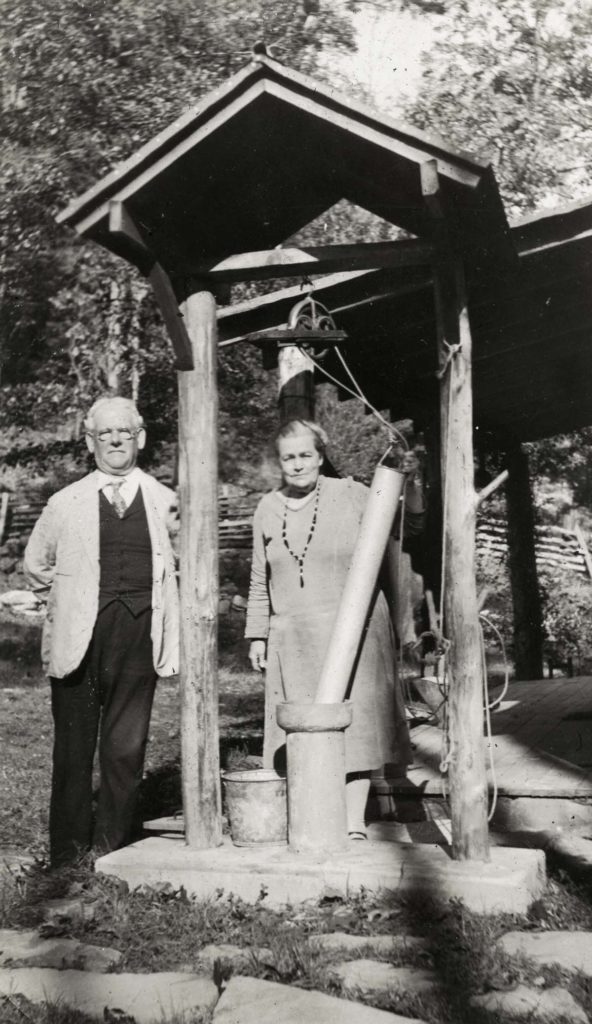
Angela Melville Album II – Part VI. [Rev. and Dr. Stapleton] [melv_II_album_298x.jpg]
[cobb_line_fork_pettit_004]
-4-
…be blessed with such perfect faith. It would be like a cloak that keeps off all the winter winds. We spoke of Mr. Morris’s sermon on that morning — or I did rather– in which the scripture had been that passage which ends with the line “And underneath are the Everlasting Arms”. I said that I wished I could simply rest in that assurance, and never be drawn away from. it. Mrs. Stapleton said just as cheerfully and confidently as if she were talking about the weather, “Why of course you will. It comes in time — and grows as you grow. There’s no need of worrying.”
We had a lovely supper out on the porch, sitting long after dusk had changed to dark looking out to the valley and the steep mountain wall across the way. That finally became indistinguishable, but we could hear the insects and night birds and frogs. There was the sweetest, softest smell in the air, and occasionally we could just catch the tinkle of a cowbell far off on the hillside.
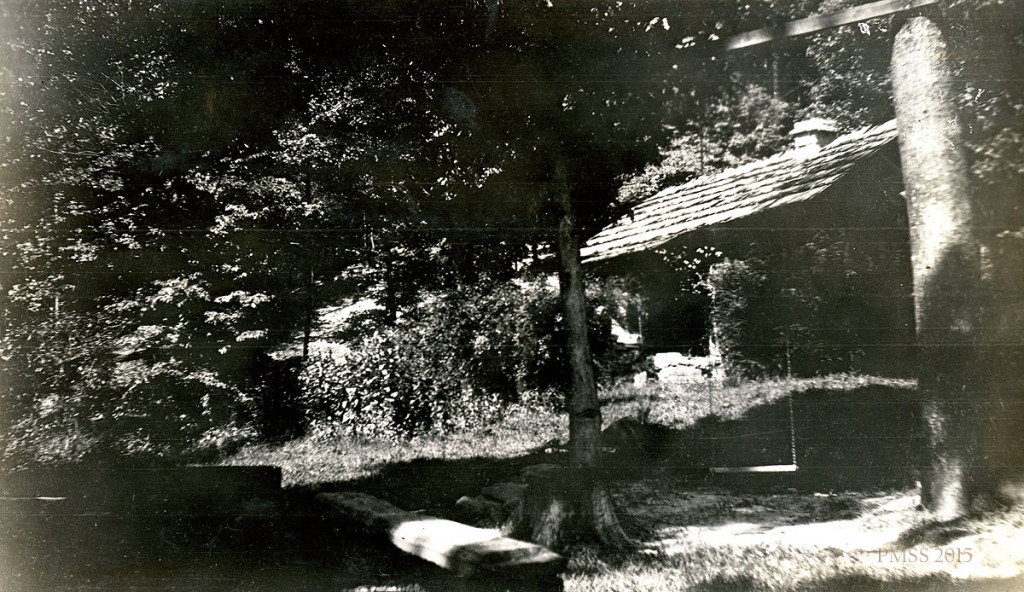
The Stapletons are very much concerned about the future of the settlement, and of themselves too, although they seem much more worried about the settlement. Their daughter Natalie, who married the German and lives in Germany, has invited them to come to Germany and stay as long as they will, the expenses of the trip to be paid by the children. So Mrs. Stapleton thought that at the end of the year they would do that and probably spend the following year in Germany. But she just didn’t know how they could leave with the problem of the settlement in the air. They wanted to be sure that someone was there who would know and love the people, and be able to help them wisely. She asked if there was a chance of my being interested — I considered it rather a high compliment that she should have enough confidence in me to suggest it. Of course there so many considerations — first of all the question of finance, which I could hardly know how to settle, and then I don’t know whether I could [truncated] settlement program alone. I have racked my brain…
[cobb_line_fork_pettit_005]
-5-
…trying to think of someone who might carry on the work with me, but I don’t know a single soul. Miss Josephine Merrill and Miss Edith Cold would both be fine, and would love to do it, of course, but they are hardly strong enough to rough it out there. I do wonder if Miss Merrill would be willing to live with me out there, and teach Sunday School and just let me take care of her, if I did take over the settlement. I could do the work all right, but there ought to be an older person there for the sake of the morale of the people. I think I shall talk it over with her sometime, when the Stapletons are ready to let it be known that they are making this their last year. And then in the matter of money I would simply have to have faith, I guess. As I say the Medical Settlement is practically taken care of, and so I should feel perfectly justified in putting all my energies into the other settlement. I do think I could live on what food and wood, and perhaps labor the neighbors might supply, and I’d be willing to take the chance on a supreme act of faith, if Mr. Morris were willing. I know that the settlement is mine if I can run it independent of the school. It has been done before, and I believe that I could do it again. Well I think I shall go on turning all this over in my mind, take the semester this winter, and come back ready to go to Line Fork if that seems wise or possible. In the meantime please don’t mention this outside. I do have the strangest premonition, and have had for a long time, that this year will bring changes in the mountains — and in my position here — and it may be that the Line Fork Settlement after all will be the working out of it. I do know that Mr. Morris is just as unsettled and troubled as I am, about his own place here. I believe, and Barby does too, that he has made, or is making a decision on his principles and policy, which will make or break his association with me in the future. I can’t follow into the intricate business of progressive education, and leave behind simple missionary ideas that are all our people can understand, and which mean so awfully much to them. And he can’t either, sincerely, as it is now. If he goes that way, then he’s got to change his whole outlook…
[cobb_line_fork_pettit_006]
-6-
…and become a different person. Mrs. Morris wants that, of course. But for myself, I’ve already made my decision in the other direction. Well I sometimes wish I could look into the future a few years, and then again I’m glad I can’t.
Well I slept on the sleeping porch and wakened long before dawn — saw the light come down the valley, and was up a little after six. We had breakfast on the porch, watching everything wake up that we had seen go to sleep the night before, and before we were through Rosa Sparkman had come with her cake and sweet potatoes for the picnic. While we were having the worship after breakfast Isabel Lewis came with the milk, and then the day was well begun. We blew up balloons to hang on a string outdoors, I squeezed four dozen lemons, and spread peanut butter on four dozen buns, and by that time some of the women were arriving with their various contributions toward the dinner. Neely of course was the first to come, with the bucket of corn and another bucket of beans. She seemed very quiet and not very well — which was to be expected after so recent a flaying from Finly, who is without a doubt one of the meanest, worst men in the world. And then Mrs. Jas Cornett came with her cake and biscuits. She said she would have had to come to see Miss Cobbs if there warn’t ary other reason under the sun. You see I had been to see all three of her boys in Boston, and we had a good time talking of Winfield and Morgan and John. John was starting in washing dishes when I was there. She asked me if I knew Helen, the girl Win was “talking to” in Boston. Mrs. Wright, who has TB according to Mary Frances Hall, came carrying a big fat baby, well able to walk by himself —she’s smaller than mother even, and I thought it was a shame. She has three children in Pine Mountain School. And Edna Cornett‘s mother came, and Mary Smith — who is the fine looking mother and daughter of a bad family of men. She is really a good woman herself, and it is remarkable what a serene front she always shows in the face of drinking, jail sentences, and even murder on two or three occasions. She brought some fall beans, and if you don’t…
[cobb_line_fork_pettit_007]
-7-
…what fall beans are, I must tell you. I remember one time when Miss Pettit asked me if I knew, and I made the mistake of saying I supposed they must be beans that were ripe in the fall. She nearly went into frenzies. Real fall beans are round — almost like peas, but larger, and a little on the order of butter beans, but dark in color, and cooked with the shells, just like ordinary string beans. And they have the most delicious flavor. I don’t believe you can get them in Indiana. Edna Cornett’s mother was there, and Bertha Lewis‘s mother, and Ruth Ann Cornett‘s sister and so on — so many mothers and relatives of children here at the school. Most of these children have been sent to the school by the Stapletons or Miss Pettit. Nancy Jane sent a note saying that she had intended to make some fried pies for Miss Cobbs, but couldn’t get them done because she was sick, and to tell Miss Cobbs that she would make fried pies when stir off time came and Miss Cobbs was to come home with Arnie [Hall] when he came. So that’s something to look forward to.
Well we put everything out on the long table under the trees — cakes pies, fried chicken, boiled chicken, sandwiches, sweet potatoes, corn, beans, jelly, cornbread, tomatoes, and so on. The lemonade was already with the tincups, and we each had a drink, so that everything would be ready for the school children. The two schools were coming. And so we waited, and we waited–and we waited. Everybody became a little anxious — with the food there, and we becoming hungrier and hungrier. Somebody said that one school had gone down after the other — it was the Bear Branch School and the Coil Branch School that were coming. And then Mrs. Lewis said that it was because the teacher from Bear Branch, that had just got married a few weeks before, had to go home and was exchanging his cloths. We thought maybe he had to wash his shirt — there was a good deal of puzzling, and some anxiety, and then finally we heard them coming up the the road singing.
The whole line stopped on the hill on the other side of the Cabin, and sang lustily [?], “How d’ye do Mr. Stapleton, how d’ye do? Is there any-…
[cobb_line_fork_pettit_008]
-7- [sic]
…thing that we can do for you” — etc. And then “How d’ye do Miz Stapleton” etc. It gave me quite a thrill to hear them, and a pang too, to think that this was the last time that they would probably ever sing to the Stapletons at the Labor day picnic.
The whole day went off without a hitch. They passed around single file for their drink of lemonade, and I was pleased to discover lots of small brothers and sisters of Pine Mountain students. And then their plates were filled, sky high with the most indigestible mixture of two or three kinds of cake and pie and sandwiches and whatnot, which they ate and gobbled enthusiastically. After dinner came the games and contests between the two schools. The teachers interested me a great deal — brothers they are, and they look like twins. Both are cousins of our Chloa Smith, and they did look like such awfully fine young men — the kind we’re proud to have grown up in and be a part of the mountains.
I spent most of the afternoon talking with different ones of the women, especially Mrs. Jas and Mrs. Lige Cornett, mothers of the boys in Boston. I was interested in what they said of the boys. “No,” said Mrs. Jas. “I wont keep my boys here if they got grit enough in ’em to leave. There ain’t nothin’ fer them here. And if they come back to the hills they’ll grow up just like us — nobodies, and have to scrub and hustle fer everything you get.” I felt a little sorry, but of course not surprised to hear her speak so. Her husband is a bootlegger and all her boys drink — Morgan did especially before he went to Boston. I don’t like the idea that a man is lucky not to have to “scrub” for what he gets, and I wanted to say that we who are here have a good deal to do with the deciding of whether or not there is something worthwhile for the boys at home. But she certainly does the best she knows how to do, and so do they most of them — I held my tongue. She is a good woman, and I like her.
During the afternoon we passed around the saltwater taffy I had brought and everyone liked it quite a lot. There was a good deal of joking [indecipherable text] the candy was wrapped up like taffy kisses. And at the…
[cobb_line_fork_pettit_010]
-8- [sic]
……end of the day both schools stood in line, received an all day sucker, and they marched off single file, singing.
We rested a few minutes after everyone had left, and then had a bite to eat, before I started. Mr. Stapleton walked as far as the woods with me, and there I overtook Addie Cornett, who was going to Emily Creech‘s at Pine Mountain. So we walked the rest of the way together. She is a sister of the boys in Boston, and such a fine, good looking girl. All the family are fine looking for that matter. We stopped a moment at Mrs. Gib Lewis‘s to admire her dahlias, which are perfectly lovely — and she gave me a huge bouquet.
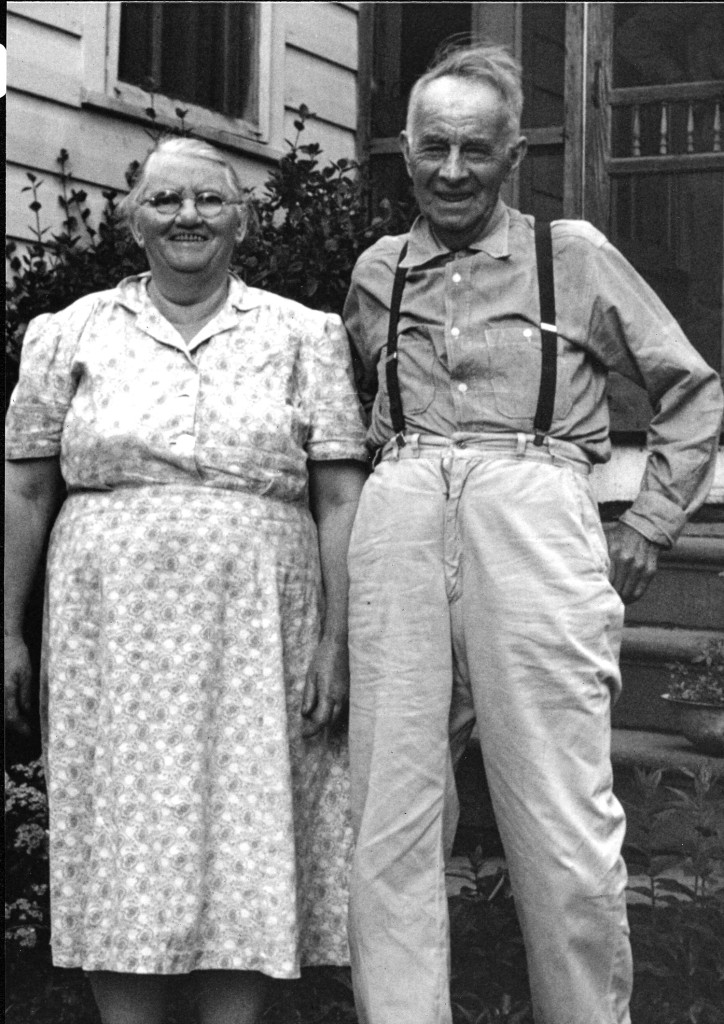
Friends & Neighbors: Delia and Henry Creech. [VI_51_friends_neighbors_1689x_mod.jpg]
Well that ended my little jaunt. But I think this winter will see more of them. I asked Mr. Morris if I might have the afternoons off and do my afternoon’s work in the evening. He refused that “pine-blank” as the folks say, but suggested that I take any afternoon I wanted off, at any time. Of course I couldn’t do that — it just wouldn’t be possible — but I decided to take Friday regularly. So now I’m letting it be known that [indecipherable] country people may expect me to come “a-traipsin’” on Friday — that… [truncated?]
GALLERY: ALICE COBB STORIES Line Fork Community Remembers Miss Pettit
- cobb_line_fork_pettit_001
- cobb_line_fork_pettit_002
- cobb_line_fork_pettit_003
- cobb_line_fork_pettit_004
- cobb_line_fork_pettit_005
- cobb_line_fork_pettit_006
- cobb_line_fork_pettit_007
- cobb_line_fork_pettit_008
- cobb_line_fork_pettit_010
Return To:
ALICE COBB GUIDE To Writings, Collected Stories
See Also:
ALICE COBB Staff Trustee Biography
KATHERINE PETTIT Director Biography

